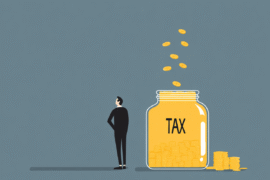This article may contain references to products or services from one or more of our advertisers or partners. We may receive compensation when you click on links to those products or services. Nonetheless, our opinions are our own.
The information presented in this article is accurate to the best of our knowledge at the time of publication. However, information is subject to change, and no guarantees are made about the continued accuracy or completeness of this content after its publication date.
When you think about your paycheck, those deductions can sometimes feel like a mystery. You work hard for your money, so knowing where it goes is crucial. One significant part of that deduction is income tax. But what exactly are income taxes, and why do they matter to you as a citizen? We’ll unravel the complexities surrounding income taxes, exploring their purpose, how they impact your financial life, and what you need to know to navigate this aspect of your economic responsibilities. Whether you’re filing your first tax return or you’ve been at it for years, getting a clear picture of income taxes can empower you to make informed decisions and perhaps maximize your earnings. So, let’s dive in!
The Basics of Income Taxes

When it comes to income taxes, the fundamentals can help demystify the process and set you on the right path for financial planning. In simple terms, income tax is a percentage of your earnings that you pay to the government. This tax comes into play whenever you earn money, whether through a job, investments, or freelancing. While the thought of taxes might feel overwhelming, they play an important role in funding public services like education, healthcare, and infrastructure that benefit all of us.
Here are a few points to grasp:
- Tax Brackets: The tax rate you pay increases with your income level. Knowing these brackets can help you estimate how much you might owe.
- Deductions and Credits: Familiarize yourself with potential deductions (expenses you can subtract from your income) and credits (dollar-for-dollar reductions of your tax bill) to lower your liability.
- Filing Status: Your marital status and family situation can influence your tax filing, so be sure to choose the correct status, as it affects your rates and potential deductions.
Take a look at this simple table that summarizes common tax brackets for the current year (Federal Income Tax Rates and Brackets | Internal Revenue Service, n.d.):
| Tax rate | on taxable income from | up to |
|---|---|---|
| 10% | $0 | $11,600 |
| 12% | $11,601 | $47,150 |
| 22% | $47,151 | $100,525 |
| 24% | $100,526 | $191,950 |
| 32% | $191,951 | $243,725 |
| 35% | $243,726 | $609,350 |
| 37% | $609,351 | And up |
Being informed about how income taxes work empowers you to make better financial decisions. Remember, proactive learning now can save you time and stress come tax season!
How Income Taxes Impact Your Earnings
Income taxes significantly influence the amount of your hard-earned money you actually receive from your paycheck. The impact of these taxes can help you make informed financial decisions and plan better for the future. Your income is usually subject to federal, state, and sometimes local taxes, which can vary based on where you live and how much you earn. It’s important to be aware of the different tax brackets and how your income aligns with them, as this will affect your overall tax liability.
Here are some factors to consider:
- Tax Brackets: As your earnings increase, so too may your tax rate. Being strategic about your income, such as when you receive bonuses or a raise, can influence your overall tax burden.
- Deductions and Credits: Maximize your deductions to lower your taxable income. Familiarize yourself with potential credits that can help reduce what you owe.
- Withholding Settings: Adjusting your withholding allowances can affect how much is deducted from your paycheck. It’s important to find a balance that prevents overpaying or underpaying taxes throughout the year.
By being proactive and engaged with your tax situation, you’re setting yourself up for financial success. Educate yourself about your tax obligations and consider consulting with a tax professional for personalized advice tailored to your unique circumstances.
Tax Deductions and Credits
Knowing the landscape of tax deductions and credits can transform the way you approach your income tax filings. Tax deductions lower your taxable income, meaning you only pay taxes on the amount after certain expenses are subtracted. Common deductions you might consider include:
- Mortgage Interest: If you own a home, the interest you pay on your mortgage can be deducted.
- Student Loan Interest: Payments made toward student loans may provide additional deductions.
- Medical Expenses: Certain unreimbursed medical expenses can also be subtracted if they exceed a specified percentage of your income.
On the other hand, tax credits reduce your tax bill dollar-for-dollar, providing a direct benefit. They can often yield a greater financial advantage than deductions. Here are a few examples that might apply to you:
Earned Income Tax Credit (EITC): A refundable credit aimed at low- to moderate-income working individuals and families.
Child Tax Credit: If you have dependents, this can significantly reduce your tax liability.
Education Credits: These can help offset the costs associated with higher education, making college more affordable.
To make it clearer, here’s a simple comparison:
| Type | Effect on Taxes |
|---|---|
| Deductions | Reduces taxable income |
| Credits | Reduces tax bill directly |
By knowing how to navigate these opportunities, you can maximize your refund or minimize what you owe, ultimately boosting your financial health. It pays to be informed and proactive in exploring these options!
Voted "Best Overall Budgeting App" by Forbes and WSJ
Monarch Money helps you budget, track spending, set goals, and plan your financial future—all in one app.
Get 50% OFF your first year with code MONARCHVIP
Tips for Organizing Your Finances for Tax Season
As tax season approaches, taking the time to get your financial documents in order can make all the difference. Start by creating a dedicated folder, whether digital or physical, where you can store all relevant paperwork. This includes your W-2s, 1099 forms, and any statements related to investments or mortgage interest. Organizing these documents early on can alleviate last-minute stress and ensure that nothing is overlooked.
Consider using a simple checklist to stay on track. Here’s a swift snapshot:
- Gather Income Statements: W-2s, 1099s, and bank statements.
- Collect Deduction Documents: Medical bills, charitable donations, and home office expenses.
- Track Your Expenses: Use budgeting apps or spreadsheets to compile spending data.
- Review Previous Returns: Look at last year’s tax return to identify carryovers or deductions you might have missed.
Additionally, consider creating a table to summarize your different income sources. This can help you visualize where your money is coming from and spot any potential issues:
| Source | Amount |
|---|---|
| Salary | $50,000 |
| Freelance Work | $10,000 |
| Investments | $5,000 |
Taking these steps will not only ease your filing process but also empower you to understand your financial landscape better. You’ll thank yourself when you sit down to prepare your taxes and find everything you need right at your fingertips!
Planning Ahead: Strategies to Minimize Your Tax Burden
Effectively managing your income tax obligations can be a game-changer in safeguarding your financial health. Here are a few strategies that can significantly reduce your tax burden:
- Maximize Retirement Contributions: Consider contributing to retirement accounts such as a 401(k) or an IRA. Not only do these contributions reduce your taxable income for the year, but they also pave the way for a secure financial future.
- Utilize Tax Deductions and Credits: Familiarize yourself with available deductions like the mortgage interest deduction or educational tax credits. These can help lower your overall taxable income.
- Consider Tax-Loss Harvesting: If you have investments, you can sell losing holdings to offset capital gains on winners, effectively lowering your tax bill.
Additionally, keep meticulous records of your expenses throughout the year. This will make it easier to identify potential deductions and ensure you aren’t overlooking tax-saving opportunities.
| Action | Potential Tax Savings |
|---|---|
| Maximize Retirement Contributions | Up to $20,500 (or $27,000 if over 50) per year |
| Home Office Deduction | Up to $1,500 based on simplified method |
| Health Savings Account (HSA) | Up to $3,600 (individual) or $7,200 (family) |
By proactively implementing these strategies, you can take charge of your financial future and enjoy greater freedom from excessive tax burdens.
The Importance of Staying Informed About Tax Changes
Tax laws are subject to frequent evolution, often resulting in significant impacts on your finances. Staying updated on these changes is necessary because even minor adjustments in tax regulations can affect your income and savings strategies. For example, knowing about shifts in tax brackets or new credits can allow you to maximize your deductions or minimize your taxable income. Ignoring these updates could lead to missed opportunities and potentially costly mistakes.
Here are a few reasons why keeping informed about tax changes is beneficial for you:
- Informed Decisions: Knowing the latest tax regulations helps you make better decisions regarding investments, savings, and retirement accounts.
- Tax Planning: Being proactive in your tax planning ensures you can capitalize on available deductions and credits.
- Compliance: Staying updated helps you remain compliant with the IRS and avoid penalties or audits.
- Long-term Strategy: Knowing about future changes can aid in developing a long-term financial strategy that aligns with your goals.
Frequently Asked Questions
What are income taxes?
Income taxes are levies imposed by governments on individuals and businesses based on their earnings or income. They are a primary source of revenue for funding public services and infrastructure, including education, healthcare, and transportation.
Who is required to pay income taxes?
Generally, all individuals and businesses that earn above a certain threshold are required to pay income taxes. This includes wages from employment, earnings from self-employment, and profits from business operations. Tax requirements can vary based on the jurisdiction and specific regulations.
How is income tax calculated?
Income tax is typically calculated based on a percentage of your taxable income after deductions and exemptions are applied. Different income levels can be taxed at different rates, commonly referred to as a progressive tax system. This means that as your income increases, the rate you pay on additional income also increases.
What happens if I don’t pay my income taxes?
Failing to pay income taxes can lead to serious consequences, including penalties, interest on the unpaid amount, and potential legal action. The government has the authority to garnish wages or seize assets to collect unpaid taxes.

Reviewed and edited by Albert Fang.
See a typo or want to suggest an edit/revision to the content? Use the contact us form to provide feedback.
At FangWallet, we value editorial integrity and open collaboration in curating quality content for readers to enjoy. Much appreciated for the assist.
Did you like our article and find it insightful? We encourage sharing the article link with family and friends to benefit as well - better yet, sharing on social media. Thank you for the support! 🍉
Article Title: Income Taxes: How to Navigate Your Tax Bracket and Save
https://fangwallet.com/2025/06/28/income-taxes-how-to-navigate-your-tax-bracket-and-save/The FangWallet Promise
FangWallet is an editorially independent resource - founded on breaking down challenging financial concepts for anyone to understand since 2014. While we adhere to editorial integrity, note that this post may contain references to products from our partners.
The FangWallet promise is always to have your best interest in mind and be transparent and honest about the financial picture.
Become an Insider

Subscribe to get a free daily budget planner printable to help get your money on track!
Make passive money the right way. No spam.
Editorial Disclaimer: The editorial content on this page is not provided by any of the companies mentioned. The opinions expressed here are the author's alone.
The content of this website is for informational purposes only and does not represent investment advice, or an offer or solicitation to buy or sell any security, investment, or product. Investors are encouraged to do their own due diligence, and, if necessary, consult professional advising before making any investment decisions. Investing involves a high degree of risk, and financial losses may occur including the potential loss of principal.
Source Citation References:
+ Inspo
Federal income tax rates and brackets | Internal Revenue Service. (n.d.). https://www.irs.gov/filing/federal-income-tax-rates-and-brackets












































